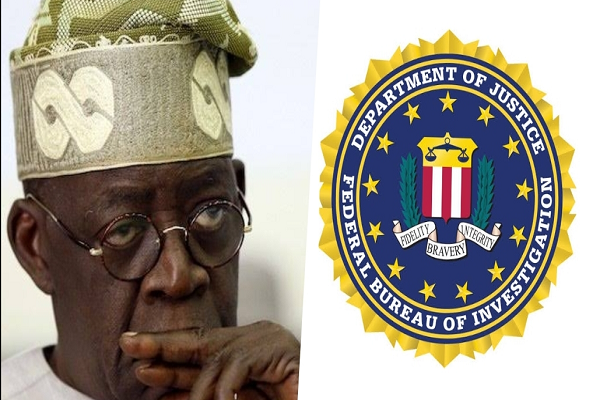The United States (U.S.) Federal Bureau of Investigation (FBI) has foreclosed the possibility of making public any documents or information relating to President Bola Ahmed Tinubu.
The FBI stated its position on the issue in a suit it filed before the United States District Court of Columbia by one Aaron Greenspan, who is seeking to compel U.S. security agencies, including the FBI to release some purported documents and information about Tinubu and “Mueez Adegboyega Akande (deceased as of 11/16/2022).”
The response, dated October 30 is in relation to Greenspan’s application for the court to reconsider its ruling of October 23, rejecting his emergency motion for the release of the documents and information he is seeking in the substantive suit he filed under the Freedom of Information Act (FOIA).
In the court document, titled: “Defendants’ response to plaintiff’s for reconsideration,” it was “in plaintiff’s motion for reconsideration, he argues that the court is wrong because FOIA exemptions had already been largely, or at least partially, overcome according to the representations by defendants in their September 11, 2023 Joint Status Repost.
“Plaintiff entirely misapprehends the Joint Status Report. None of the parties has conceded any FOIA exemptions.
“As to the actions that certain defendants agreed to take by the end of October, the FBI stated that it will release records relating to the two FOIA requests that sought records involving other individuals, not Tinubu.
“As to the Tinubu requests, the FBI asserted Exemptions (b)(6) and (b)(7)(C) Glomar response and neither confirmed nor denied the existence of records sought in those requests.
“State and Executive Office for U.S. Attorneys (EOUSA) stated that they anticipate sending initial responses – not necessarily documents.
“Absent any unforeseen circumstances, FBI, State, and EOUSA will comply with their representations made in the Joint Status Report.
“As to irreparable injury, plaintiff now concedes that ‘it is likely that this injury has already transpired’ and does not even contend – let alone establish – that the public interest outweighs the privacy interests, or that the equities favour his position.
“Defendants reiterate that they oppose plaintiff’s characterization of the Joint Status Report filed September 11, 2023.
“Plaintiff states, ‘defendants acknowledged that plaintiff’s FOIA requests were valid and waived and/or reversed many of their prior erroneous denials and objections.’
“Plaintiff contends that the defendants made ‘existing promises to produce documents.’
“The only party that has acknowledged responsive documents that are not subject to an exemption and will be produced is the FBI, who will produce records not related to Tinubu. No exemptions have been waived.
“For these reasons, the court should deny plaintiff’s motion for reconsideration.”
In June, Greenspan filed the civil suit, marked 23 – 1816 under the FOIA, against the EOUSA, Department of State (DOS), FBI, Internal Revenue Service (IRS), Drug Enforcement Administration (DEA), and the Central Intelligence Agency (CIA).
He alleged that the defendants – EOUSA, DOS, FBI, IRS, DEA and the CIA violated the FOIA by “failing to issue determinations within the statutory deadline,” “failing] to conduct reasonable searches for records,” and “failing to produce records responsive to” his FOIA requests.
Greenspan had, in an FOIA request to the EOUSA, sought for “records from the Northern District of Illinois and/or Northern District of Indiana involving charging decisions for the following individuals – Bola Ahmed Tinubu (President of Nigeria as of 2/2023” and “Mueez Adegboyega Akande (deceased as of 11/16/2022.”
He told the court, among others, that his request for prompt release of the documents, even before the hearing scheduled for October 31 was because “the Nigerian Supreme Court will hear an appeal of a judicial tribunal’s decision confirming Mr. Tinubu as President of Nigeria on Monday, October 23, 2023.”
Greenspan claimed that the Supreme Court deliberately moved the hearing of the appeals by Atiku and Obi to yesterday to render his suit before the U.S court nugatory, contending that the documents he requested for “would likely be directly relevant to the foreign proceedings in Nigeria.”
In his October 23 ruling, Judge Beryl A. Howell of the US District Court of the District of Columbia, held among others that Greenspan failed to satisfy the relevant conditions for the grant of his prayer for a temporary relief, as contained in the emergency hearing motion he filed on October 20.
Judge Howell further held that Greenspan failed to establish that he is likely to succeed on the merits; that he is likely to suffer irreparable harm if the preliminary relief he sought was not granted; that the balance of equities tips in his favour, and that the relief he seeks is in the public interest.
The judge, who also noted that Greenspan has not established that the purported documents and information he wants the court to compel the defendants to produce actually exist, further held that “neither a preliminary injunction nor a temporary restraining order is appropriate in this case.
“Given that the FOIA request is for records that, if any exist, may be of a highly sensitive and private nature, and that the subject of those documents – Bola A. Tinubu – has had no opportunity to protect his privacy interests in any such records, the balance of equities militates strongly in favour of denying this emergency motion.”
He held that the position of the law is that, in such a case, the plaintiff bears the burden of proving that he/she is likely to succeed on the merits of the case.
Judge Howell added: “In plaintiff’s underlying FOIA request and complaint, he seeks documents relating to purported federal investigations into President Tinubu.
“As previously noted, EOUSA originally denied plaintiff’s FOIA request, invoking FOIA Exemptions 6 and 7(c), which protect information that would constitute unwarranted invasions of personal privacy and information compiled for law enforcement purposes that may constitute an unwarranted invasion of the personal privacy of a third party.
“Plaintiff has failed even to attempt to argue how his request may overcome those exemptions and achieve a likelihood of success on the merits. This failure to address this important factor in his emergency motion weighs strongly in favour of denying his motion.”
The judge also found that the plaintiff failed to demonstrate that he was going to suffer actual and real irreparable injury if the relief he sought was not granted, rather than a mere possibility or theoretical injury.
He added that the “plaintiff falls far short of satisfying this standard. He (plaintiff) has not supplied the court with any indication of a concrete, actual threat that he will suffer in the absence of an injunction. While his emergency motion states that a Nigerian Supreme Court hearing is scheduled to occur in the coming days, plaintiff cites no injury he will suffer that is in any way traceable to the relief requested in this motion.
“Granting plaintiff’s emergency motion would essentially allow him to jump the line ahead of other requests deemed similarly time-sensitive under FOIA’s expedition standards. The inherent tradeoffs implicated in ordering an agency to produce records in a specific FOIA request ahead of others by granting a preliminary injunction thus, must be considered in evaluating the balance of the equities, and weigh heavily in favour of denying such injunctive relief.
“Plaintiff has not made any representation to the court that the balance of equities tips in his favour or that the granting of his motion would further the public interest. For the foregoing reasons, it is hereby ordered that plaintiff’s emergency motion for a hearing to compel immediate document production is denied,” the judge said.
President Tinubu’s lawyers have filed a motion before the court, seeking to be made a party to enable them to defend their client.


























